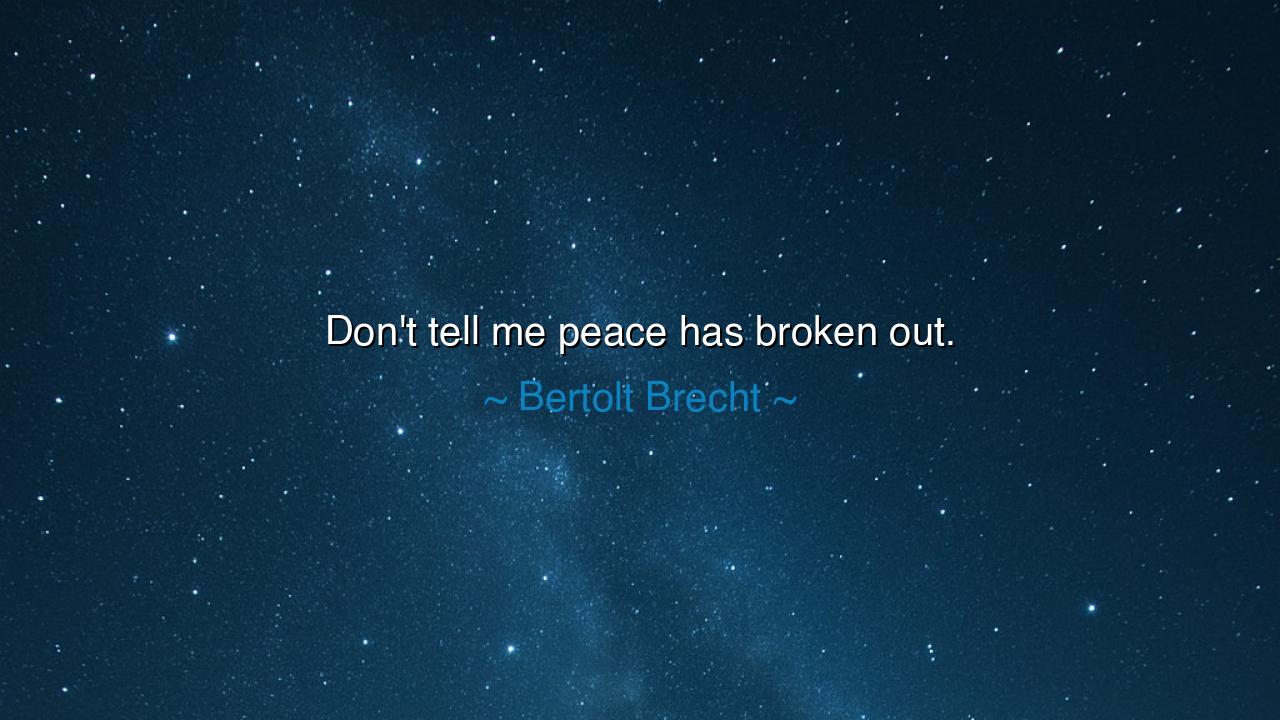
Don't tell me peace has broken out.






"Don't tell me peace has broken out." These words, spoken by Bertolt Brecht, are a powerful reminder of the illusion of peace that can sometimes be presented to the world. Brecht, a playwright and poet, was deeply aware of the complexities and contradictions that underlie human conflict. Peace, he suggests, is not simply the absence of war or violence, but a much deeper, more complex state—one that cannot be declared by mere proclamation. To claim that peace has "broken out" is to overlook the hidden struggles, the unresolved tensions, and the systemic issues that continue to shape the lives of those living in the aftermath of conflict. Brecht challenges us to question the very nature of peace and to resist being lulled into complacency by empty words.
In the ancient world, Herodotus, often called the father of history, understood that the peace achieved by conquest or negotiation was often fragile, built on foundations of inequality and injustice. The ancient Greeks spoke of Pax Romana, the peace established by the Roman Empire. While it allowed for a period of stability and prosperity within the empire, it was also a peace built upon the subjugation of millions and the crushing of any dissent. Brecht’s words echo this understanding: peace is not simply the absence of conflict but the restoration of justice and equality among all people. A peace that silences the oppressed, that glosses over the human cost of war, is not peace at all—it is a false peace, a superficial peace that masks the wounds beneath.
Consider the example of Alexander the Great, who, after his conquests, declared peace in the lands he had subdued. He sought to create a new world order, a world where different cultures could coexist under his rule. Yet, despite his victories and the apparent cessation of war, the peace Alexander left behind was unstable. His empire fractured soon after his death, as the peoples he had conquered never truly embraced the kind of peace he envisioned. His empire, built through force, could not provide the kind of lasting peace that Brecht would recognize. The peace that Alexander imposed was merely the quiet between battles, not a deep, lasting harmony between all peoples.
The fall of Rome itself provides another illustration of Brecht’s skepticism about declarations of peace. The Roman Empire, at its peak, boasted of its Pax Romana, but within its borders, the signs of unrest were ever-present. The empire’s peace was maintained not by the justice of its systems, but by the sheer might of its legions. When the empire eventually crumbled, it became clear that the peace they had celebrated was a veneer, easily shattered when the underlying issues—economic inequality, political corruption, and class division—remained unaddressed. Brecht’s cautionary words remind us that when peace is declared too quickly, without addressing the root causes of conflict, it is doomed to be fragile and temporary.
In our own time, we see this dynamic play out in countless conflicts, both large and small. The end of World War II brought about a peace treaty between the warring nations, but even after the signing of those treaties, tensions continued to simmer. The Cold War between the United States and the Soviet Union did not end with the signing of peace accords, but with a prolonged suspension of hostility. The Vietnam War, similarly, ended with the signing of peace agreements, yet the real, deep peace—the kind of reconciliation between nations and peoples—remained elusive for years. Brecht’s words serve as a challenge to us all: peace cannot be a mere formality or a signing of documents—it must be the result of a transformation in the very fabric of societies, of the healing of deep divisions and the addressing of past wrongs.
The lesson here is one of awareness and vigilance. Peace is not something we can take for granted, nor is it something that can be achieved simply by declaring it. Brecht urges us to look beyond the surface, to see the complexities and contradictions that lie beneath. True peace is a dynamic, ongoing process—one that requires continuous effort, not just a momentary cessation of violence. To speak of peace is not to ignore the struggles of the oppressed or to gloss over the unresolved tensions that still simmer beneath the surface. True peace comes when justice is done, when inequalities are addressed, and when people have the freedom to live without fear of violence or exploitation.
In your own life, remember that peace is a process, not a declaration. When you hear the call for peace, ask yourself: What is the cost? Who is still suffering in silence? What hidden conflicts are still at play? Are we truly living in peace, or is it a fragile, temporary ceasefire? Just as Brecht warns against being lulled by the false promises of peace, we must be diligent in seeking a peace that is deep, lasting, and rooted in justice. When you are faced with conflict or division, seek not just the end of the immediate struggle, but the lasting transformation that leads to true, meaningful harmony.
Let Brecht’s words remind us that peace is a living, evolving concept. We must all take part in it—not just by signing treaties or agreements, but by actively working to mend the wounds that divide us. True peace begins within us, within our relationships, and in the communities we build. It is in the quiet work of reconciliation, understanding, and compassion that we find the path to real peace—a peace that is not a temporary lull, but a lasting and deeply transformative force for good.






AAdministratorAdministrator
Welcome, honored guests. Please leave a comment, we will respond soon